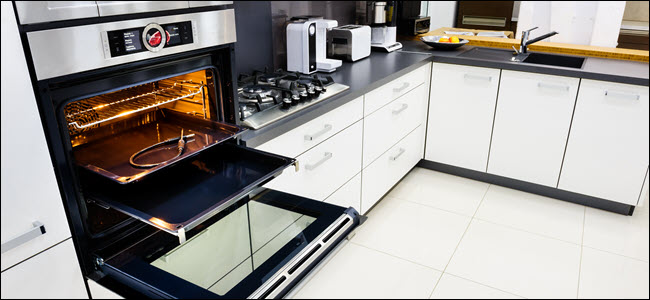
Your kitchen is full of appliances, but they’re dumb. Technology, like smart speakers, lights, ovens, and faucets, can make cooking, cleaning, and grocery shopping easier. Creating a smart kitchen isn’t hard, and everyone in the home can benefit. Here’s how.
Why a Smart Kitchen?
Your kitchen is a room of productivity and mess. You cook your meals, clean your dishes, and maybe even eat in your kitchen. Every cabinet, utensil, and tool contributes to your kitchen experience, for better or worse. And adding intelligence to your cooking space can improve your recipes and speed up the work.
Kitchens can host some of the most useful smarthome technology in your home. You can buy smart ovens that take the guesswork out of cooking times and suggest recipes you may not have tried or a smart faucet that you can turn on and off by voice, or ask to pour a set amount of water. But it’s not all big, flashy new appliances.
A smart display like the Nest Hub or Echo Show can convert measurements for you, set timers, or show the next steps of a recipe you’re working on, and smart lights are an inexpensive way to improve the lighting in your kitchen. For example, smart light switches can save you money by turning everything off at scheduled times, and smart LED strips can light the dark spaces under a cabinet.
Every kitchen is unique, but the advantage of creating your smart kitchen is choosing just the technology that you benefit from and skipping everything else.
Start With a Smart Speaker or Display

Smart ovens and faucets are impressive, but the first thing we recommend for every kitchen is also the cheapest: A smart speaker like an Amazon Echo or Google Home. Or, better yet, a smart display like the Nest Hub or Echo Show.
Echo Dots and Google Home Minis can typically be found in the $30 to $50 range, depending on sales, and the functionality they provide goes well beyond the cost. Google’s Nest Hub (formerly known as the Google Home Hub)and Amazon’s Echo Show cost a bit more at $129.99 and $229.99, respectively, but add a lot over a basic smart speaker.
With a smart speaker, you can set multiple named timers to keep track of your food cook times. If your recipe calls for a measurement you don’t have, you can ask for a conversion, like “how many teaspoons in two tablespoons?” or “how many cups in a liter?” when you need to convert to another measuring system.
Smart speakers also serve as an intercom if you spread them throughout your home, so you can easily announce when dinner is ready. And to keep yourself entertained, you can listen to music while you cook.
Read the remaining 22 paragraphs
Source : How to Set Up a Smart Kitchen











